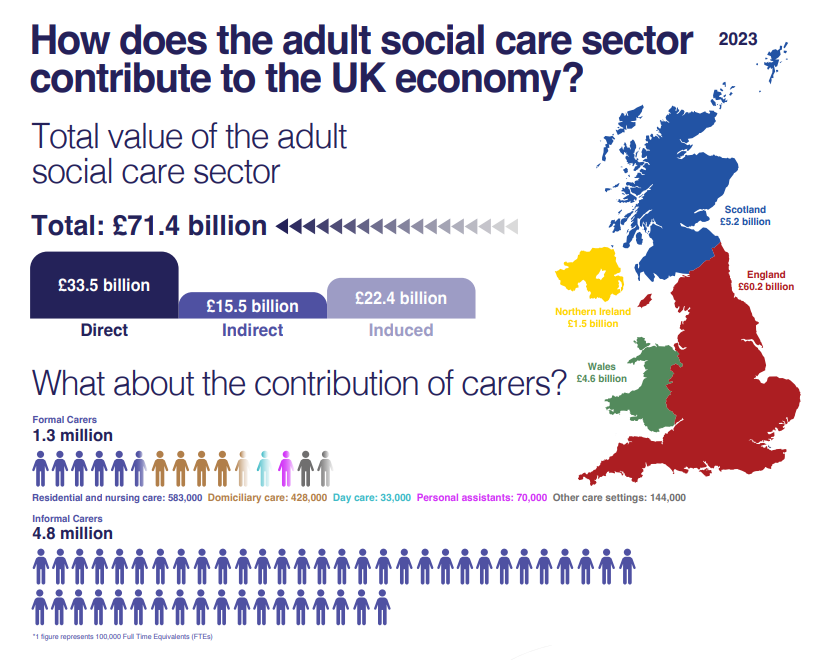Who we are?
We are 7 organisations located across the UK and Ireland who believe people accessing care and support should have quality care, control, protection and increased quality of life.
We work together to effect positive change through improvement of practice, workforce development and regulation in social care, social work and early years.
Strong Partnership
We work together across the UK and Ireland to support dynamic workforce development and effective regulation in social work, social care, children and young people services, early years and childcare.
- CORU
- Early Years Alliance
- NI Social Care Council
- Scottish Social Services Council
- Skills for Care
- Social Care Wales
- Social Work England.
Some of our partners are also Skills Councils.
Please see below for further information on specific work on skills and benchmarking.
National Benchmark standards
Sharing Good Practice
We work together to increase opportunities to share good practice and develop shared resources across the UK.
Please see below for further information on resources.







What we do
We work together to increase opportunities to share good practice, support our peers as critical friends, develop shared resources and increase our knowledge.
We work together for:
- Increased capacity in the workforce, to meet population needs
- Increased skills and capabilities in the workforce
- Increased use of regulation insights to inform workforce development
- Improved social care, social work and early years status
Resources
SfCD supported the development of this framework with Dr Ruth Van Dyke at St Mary’s University.
Please take a look and distribute to your contacts.
Children’s Anti-trafficking and anti-slavery Training Framework
National Occupational Standards (NOS) Review consultation 2025
The Scottish Social Services Council, in collaboration with UK partners, is leading a comprehensive review of the National Occupational Standards (NOS) for Health and Social Care and Children’s Care Learning and Development.
What are the NOS?
The NOS are evidence-based benchmarks for competent performance and used across the UK by the four nations, Scotland, England, Wales and Northern Ireland. The review process is guided by the requirements of SQA Accreditation.
NOS describe the knowledge, skills and understanding needed to do a particular job to a nationally recognised level of competence. It’s important these standards are up to date and relate to the skills and knowledge needed in different roles.
Why are the NOS important?
NOS can be used as a basis for a wide range of activities, such as:
- qualifications
- quality standards and benchmarking
- learning and development
- recruitment
- organisational planning and improvement
By taking part in this consultation you can help ensure that the NOS are fit for purpose and reflect current practice.
Why are we reviewing the NOS?
It has been more than 10 years since the NOS were last reviewed. The NOS need to reflect current practice, policy and terminology across the UK, and be current and relevant for all four UK partners. The review team has worked closely with UK partners to achieve this.
What have we done so far?
Over the last year, the Scottish Social Services Council (SSSC) has led a UK-wide review of the existing 212 NOS to make sure they are fit for purpose, equipping those working in the sector with the skills needed to meet the demands of modern health and social care. As part of this review, we carried out a gap analysis to understand which aspects of the NOS we needed to update and how, so there is a clear rationale for the changes.
For further information on the NOS review, including the specific areas we’re consulting on, gaps identified through the review, who we’ve consulted with so far and the next steps after the consultation, please visit the SSSC website.
Sector consultation
A public consultation was held between 4 August to 19 September 2025.
Launch of refreshed NOS
The consultation findings have been analysed by an external consultant and recommendations for final amendments have been made. Following the final amendments, a streamlined suite of NOS will be launched in Spring 2026.
Skills for Care and Development Shared Assessment Principles
Skills for Care and Development (SfC&D) has updated and published the Shared Assessment Principles to support high-quality, consistent assessment and quality assurance of qualifications for the social care, social work, early years and childcare workforces throughout the UK.
These principles have been developed collaboratively by SfC&D partners across England, Scotland, Wales and Northern Ireland, with input and insight from awarding organisations and other key sector stakeholders. The principles set out the minimum requirements and approaches for assessment and internal quality assurance.
The updated principles provide clarification and cover:
- Robust initial assessment, recognition of prior learning and reasonable adjustments
- Fully evidencing and justifying assessment decisions
- Direct observation as the primary method for skills-based assessment
- Demonstrating occupational competence and sector knowledge
- Assessment of knowledge-based learning outcomes
- Recording and documentation requirements
- Use of technology in the assessment process, including guidance on AI
- Internal quality assurance processes
These principles aim to ensure qualification delivery uphold sector values, promote inclusive practice, and maintain the voices of individuals who use services at the heart of learning.
Please note: there will be a period of transition and the existing principles can continue to be referenced until 31 March 2026.
Access the full Shared Assessment Principles document here.
SfCD partners adhere to shared principles for learning and qualifications in the care sector across the UK.
The strategic approach framework demonstrate how working as a partnership enhances the work of SfCD partners.

Care is one of the fastest growing areas of employment in the UK, with more and more people needing our services. Never before have there been so many great career opportunities. If you want to discover what a career in care is really like and whether a job in social care is for you, visit our interactive A Question of Care resource.
Or visit our partners’ careers sites:
Please see out latest podcast on the use of situational judgement tests for values-based assessments and candidate self-selection in the care sector.
Research into the impact of workforce regulation in adult social care
The Skills for Care and Development Alliance is conducting research to build a robust evidence base on the impact of workforce regulation within the adult social care sector. Across the UK and Republic of Ireland, approaches to regulating the adult social care workforce vary significantly. Approaches to regulating the workforce vary significantly across the UK and Republic of Ireland, offering a valuable opportunity to learn from different regulatory models and experiences.
Research aims
This research aims to contribute to the evidence base on how workforce regulation affects:
- Public safety
- Professionalism
- Quality of care
- The workforce
The research will explore drivers, benefits, barriers, risks, solutions, enablers, and outcomes associated with the implementation, delivery, and reform of workforce regulation in adult social care.
Tender opportunity: Sector perspectives on workforce regulation in adult social care
We are inviting tenders to deliver the next phase of this multi-phase research study. This phase will focus on gathering insights from adult social care providers and people who draw on care and support, capturing lived experiences and perceptions of workforce regulation across England, Scotland, Wales, Northern Ireland, and the Republic of Ireland.
The findings will inform future regulation policy and practice, supporting sector reform and the delivery of high-quality care.
Characteristics and experience of applicants
We welcome applications from individuals or organisations with:
- Proven experience in qualitative research and stakeholder engagement
- Working with adult social care providers and people who draw on care and support
- A strong understanding of adult social care and workforce regulation across the UK and Republic of Ireland
- A commitment to ethical research practices.
Key information and dates
- ITT issued: 7 November 2025
- Deadline for clarification questions: 19 November 2025
- Responses to questions circulated: 21 November 2025
- Submission deadline: 12 noon, 28 November 2025
- Email to request tender specification, queries and submissions: UK.Team@skillsforcare.org.uk
Economic and social value of the UK adult social care sector: UK
Skills for Care and Development commissioned Alma Economics to analyse the adult social care sector’s economic and social value in the UK as a whole and in each of the four nations using data from 2022/23.
It’s used to inform the economic case for investment in the social care sector and its workforce in the UK as a whole (as well as having national breakdowns). It’s also used to inform policy-making and national spending review decisions on investment.
The total direct, indirect, and induced value of the adult social care sector in the UK was £71.2 billion.
The socioeconomic benefits of the adult social care sector in the UK were £330 billion, while the costs were £140 billion (2023). This means that for every £1 spent in the sector, there was £2.40 in socioeconomic benefits.

The full UK report, a summary report and an infographic providing a visual representation of the economic value of the social care sector are available below:
Economic and social value of the adult social care sector: national breakdown
Download the reports into the economic and social value of the adult social care sector in each of the devolved nations in 2023:
England
Full reportSummary reportInfographic
(Infographic has been updated with 2024 data from the state of the adult social care sector and workforce in England report)
Scotland
Wales
Full reportFull Welsh language reportSummary reportInfographic
Northern Ireland
You can also find each nation’s Workforce Data sites below:
- Scottish Social Services Council
- Social Care Wales
- Skills for Care
- Social Work England
- Northern Ireland Social Care Council








